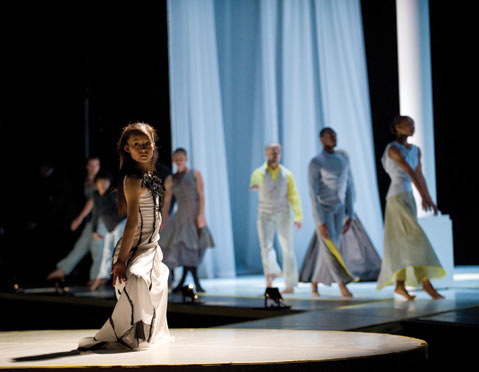Bill T. Jones Brings New Work to Santa Barbara
Fondly Do We Hope:Fervently Do We Pray Inspired by Lincoln's Life

Some people have vision, and then some people have the drive to realize that vision, even when it’s painful. Bill T. Jones is one of those people. Now 57 years old, the New York choreographer has been pushing the edges of his art form since he started making dances more than 35 years ago. The Bill T. Jones/Arnie Zane Dance Company is now celebrating its 25th anniversary-a significant accomplishment for a contemporary dance group that aims to challenge audiences at least as much as to entertain them.
On Tuesday, October 6, Jones brings his company to Santa Barbara with their new, evening-length work, Fondly Do We Hope : Fervently Do We Pray. In a departure from his typically independent creative process, two years ago Jones accepted a commission by Chicago’s Ravinia Festival to create a dance based on the life of Abraham Lincoln. A deep thinker with a sharp critical edge, Jones was well aware of the dangers of this topic: a giant figure in America’s cultural consciousness, Lincoln has already been reduced to an icon and shrouded in sentimentality. But Lincoln also represented a personal challenge to this middle-aged black artist facing a period of personal transition.
Speaking about himself in the third person, a self-conscious habit that creeps into his speech as well as his writing, Jones remembered himself as “the five-year-old boy that loved the man on the penny and the five-dollar bill as if he were Santa Claus or Jesus Christ. Even though he’s been through the radical periods of the 1960s and ’70s and he feels this alienation,” he continued, “part of him really holds out this belief that individuals can make a difference.” Sharing an excerpt from his autobiography that has been incorporated into the show, Jones intoned, “He grew up resenting politicians and patriots; however, he is surprised to realize that he has never stopped believing in great men.”
And what is a great man, exactly?
According to Jones, Lincoln is a great man “because he started out very much as a man of his era. He was a racist from Kentucky, but he had this superior intelligence and sense of morality and a very rigorous heart and a broad intellect, and I daresay a lyrical side, that allowed him to change.”
That kind of change is clearly something Jones admires, and in Fondly, he’s drawing parallels between the great changes of Lincoln’s era and those of our own. The creation of the piece coincided with the inauguration of our first African-American president, as well as with a period of war. The title of the piece comes from a line in Lincoln’s second inaugural address: “Fondly do we hope, fervently do we pray, that this mighty scourge of war may speedily pass away.”
Speaking about the early stages of the creative process, Jones described the shock of realizing how little most people, including his dancers, knew about Lincoln when they began work on this project two years ago. “If I said ‘Fourscore and seven years ago,’ a generation ago, people would all have been able to finish the line,” he said. “People now pull a blank. They have no idea what the reference is.”
On the one hand, Jones knows there’s no hope of “capturing” Lincoln in his art. “I don’t think that’s a cynical thing to say, but we can’t know Lincoln,” he reflected. “Fifteen-thousand books-plus have been written since that man died in 1865-15,000 books, and counting, so how can you ever begin to say you are going to capture him? Lincoln is a story we tell ourselves.” And at the same time, Jones is rigorous about purpose and meaning: His work has to have it. “What is this at the service of?” is a question he often asks himself.
What he’s discovered, this time around, is that history is meaningful only in the context of the present and the future. “This is not ultimately a piece about Lincoln; this is a piece about us,” he said, hinting that Fondly will touch on questions of where America will be 100 years from now. “Some things never change,” he suggested. “Like hope, like disappointment, and belief in great men and great women.”
And all the while running on a parallel track to these larger questions is the process of making art, a process Jones refers to as “wrestling with the angel.” In a statement he wrote shortly before our interview and which he shared over the phone, he spoke of the folk legend of Lincoln’s ghost train, a spectral procession said to depart Washington every April, following the route of Lincoln’s funeral train. He spoke about this image as a metaphor for Lincoln’s legacy: “[A] commitment to the democratic process, our government of the people, by the people, for the people.” “In the work,” he explained, “this hair-raising social experiment is represented by that mysterious and elusive sound of the train that Lincoln boarded in 1809, and that we ride today, teetering on the brink of panic and desperation. Lincoln’s legacy encourages us to stay committed to this harrowing journey unsure that this train ever arrives at its destination. That is the truth of what I have found. This train is still chugging along. And it is heartbreaking and frightening, but we have no choice but to ride this train.”
4•1•1
Bill T. Jones/Arnie Zane Dance Company will perform Fondly Do We Hope : Fervently Do We Pray at the Granada on Tuesday, October 6, at 8 p.m. For tickets or more information, call Arts & Lectures at 893-3535 or visit artsandlectures.ucsb.edu.



